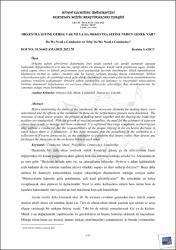Orkestra şefine gerek var mı ya da orkestra şefine neden gerek var?
Künye
Yazıcı, İ. (2022). Orkestra Şefine Gerek Var mı ya da Orkestra Şefine Neden Gerek Var? . Afyon Kocatepe Üniversitesi Akademik Müzik Araştırmaları Dergisi , CİLT VIII - ÖZEL SAYI , 443-451 .Özet
Orkestra şefinin görevlerine değinmeden önce müzik yapmak için gerekli elemanlar saptanıp bunlardaki değişkenliklerin icra sürecine yaptığı etkiler ele alınmıştır. Küçük müzik gruplarının yapısı, birlikte müzik yapma süreci ve liderlik pozisyonunun nasıl paylaşıldığı üzerinde durulmuştur. Müzik topluluklarının büyümesiyle birlikte işi sadece yönetmek olan bir kişinin varlığına duyulan ihtiyaç irdelenmiştir. Senfoni orkestralarının şefsiz de çalabildiği ancak şefin olduğu durumlarda orkestrada çalan kişilerin sorumluluklarının azalması örneklerle açıklanmıştır. Orkestra şefinin yönetmekten çok dinlemeyi ve orkestradaki müzisyenlerin birbirini dinlemesini kolaylaştıran bir pozisyon olması dolayısıyla çoksesliliğin Batı demokrasilerinin bir yansıması olduğu ortaya konulmuştur. Before mentioning the duties of the conductor, the necessary elements for making music were determined and the effects of the variations in these on the performance process were discussed. The structure of small music groups, the process of making music together and the sharing the leadership position are emphasized. With the growth of musical ensembles, the need for the existence of a person whose duty is only to manage has been examined. It is explained that large symphonic orchestras can play without a conductor, but the responsibilities of the people playing in the orchestra decrease in cases where there is a conductor. It has been revealed that the polyphony in the orchestra is a reflection of Western democracies, as the conductor is a position that listens rather than directs and facilitates the musicians in the orchestra listen to each other.
Cilt
8Sayı
Özel SayıBağlantı
https://dergipark.org.tr/tr/pub/amader/issue/74848/1179431https://hdl.handle.net/11630/10362



















